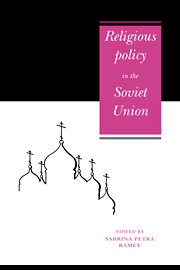Book contents
- Frontmatter
- Contents
- Notes on contributors
- Preface
- Part I Introduction
- Part II Policy apparatus
- Part III Education, socialisation, and values
- Part IV Cults and sects
- Part V The world of Christianity
- 12 The Russian Orthodox Renovationist Movement and its Russian historiography during the Soviet period
- 13 The re-emergence of the Ukrainian (Greek) Catholic Church in the USSR
- 14 Protestantism in the USSR
- 15 Epilogue: religion after the collapse
- APPENDIX: Religious groups numbering 2,000 or more, in the USSR
- Index
15 - Epilogue: religion after the collapse
Published online by Cambridge University Press: 03 December 2009
- Frontmatter
- Contents
- Notes on contributors
- Preface
- Part I Introduction
- Part II Policy apparatus
- Part III Education, socialisation, and values
- Part IV Cults and sects
- Part V The world of Christianity
- 12 The Russian Orthodox Renovationist Movement and its Russian historiography during the Soviet period
- 13 The re-emergence of the Ukrainian (Greek) Catholic Church in the USSR
- 14 Protestantism in the USSR
- 15 Epilogue: religion after the collapse
- APPENDIX: Religious groups numbering 2,000 or more, in the USSR
- Index
Summary
In August 1991, on the twenty-third anniversary of the Soviet invasion of Czechoslovakia, a group of Soviet hardliners arrested Gorbachev, and attempted to set up a restorationist regime that would roll back the reforms of the previous six years, and restore the system as it had existed under Brezhnev. The coup lasted scarcely four days. It was defeated on the streets of Moscow, where a defiant and courageous Boris Yeltsin stirred the population in leading the resistance to the coup. Ultimately, the coup's leaders, though including Gorbachev's vice president, the head of the KGB, the head of the Soviet military, and the Minister of the Interior among its members, lacked even sufficient support to effect basic orders: when, for example, they ordered KGB units to storm the parliament building where Yeltsin was trapped and kill the defiant Russian leader, KGB officers refused. The coup was doomed. Its ringleaders either committed suicide or were arrested. Their supporters were removed from responsible office. Yeltsin emerged as the hero of the New Revolution, and Gorbachev returned to the Kremlin physically drained and politically weaker.
Yeltsin took immediate steps to accelerate the de-communisation of the country, and Gorbachev, left without any alternative, resigned his post as General Secretary of the Communist Party. Meanwhile, the fissiparous forces unleashed during the coup accelerated. The Baltic Republics declared their independence once and for all, and now, in the transformed atmosphere after the coup, quickly won diplomatic recognition from fellow European states as well as from other countries, including the United States.
- Type
- Chapter
- Information
- Religious Policy in the Soviet Union , pp. 350 - 354Publisher: Cambridge University PressPrint publication year: 1992



